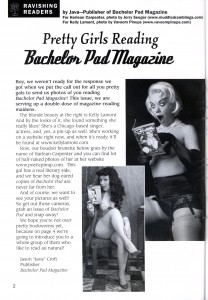I mentioned recently that I got three rejections in a single day. Those were from literary agents, and were all the quick-glance sort of rejections. When one sends out queries in batches, one should expect that the rejections from agencies that are not grabbed by the cover letter will come back in batches as well. So, while it was disappointing that three came back that way in the same day, it was not entirely unexpected.
Meanwhile, I’ve been checking the steps up to my door eagerly every day because I was waiting to hear back from a major magazine about a story I really like. Today, there was not a SASE waiting there, but a small package. I assumed it was from my folks, but on inspection it proved to be from the magazine to which I had submitted the story. I mentioned previously that one gets a feel for when a rejection is in the envelope, and this was clearly an outlier. Eagerly I tore open the package.
Inside was a copy of Esli, the Russian sister of F&SF. The editor thought I would enjoy having a copy of the Russian edition with my story Memory of a Thing that Never Was in it. He was right; I think that’s pretty damn cool. (Illustrated, even!) I’m curious now whether there are any reviews of the Russian version. In the US, most reviews said “Good writing, the reader has to fill in the gaps.” For some reviewers that was a good thing, for others not so much. I wonder how eastern Europeans will react to it; one of the big criticisms of American literature over here is that too much is explained, and that stories always come to pat conclusions. With that in mind, Memory might appeal even more to Eastern sensibilities.
I’m not sure, but I think the Russian magazine picks and chooses stories from a variety of sources, which makes it a little more special that they chose mine. I could be wrong about that, though. I wonder if the translation is any good.
I can also say now that I have been published in multiple languages. That’s pretty cool.
There were two notes in the package with the magazine. The first said something like, “thought you might get a kick out of seeing the Russian edition. I have a story of yours I’ll try to look at this weekend.” The second note said, “too much unexplained.” That’s a paraphrase, the note was by far the most comprehensive critique to come with a rejection. The editor took some valuable time to give me his opinion. He also said the piece felt like part of a larger story. Mere days ago I said that I liked stories like that.
Sigh. This was a story I’d actually revised to make things clearer, so the reader didn’t have to work so hard. Still, I have to admit that the prose is dense and can be demanding if you let it be, and there are some things that I don’t come out and explain directly. I thought some of the things the editor cited were pretty obvious by the end of the story, though. Then again, I’m not really the guy to judge that.
I think I also have to accept that what these guys really want are what I consider my second-best stories — stories that are more stylistically straightforward and don’t have multiple layers of interpretation. I write a lot of those, and I enjoy them, but generally I don’t deem them ‘worthy’ of the big magazines. This despite people around me, even readers of these pages, telling me they also like (and sometimes even prefer) those stories.
As an experiment I think I’ll loosen up the style a bit, add more explanation, and see if it still sounds good to my ear. I get paid by the word, after all. At the same time I’ll see if a more literary venue might be interested in it. Perhaps I just need to find a market for speculative fiction for people who like to be challenged. (To be fair, Fantasy and Science Fiction does sometimes publish more challenging work, but it is the exception, and it’s not mine.)
Who knows? Maybe in Russia…
 1
1
Sharing improves humanity:


